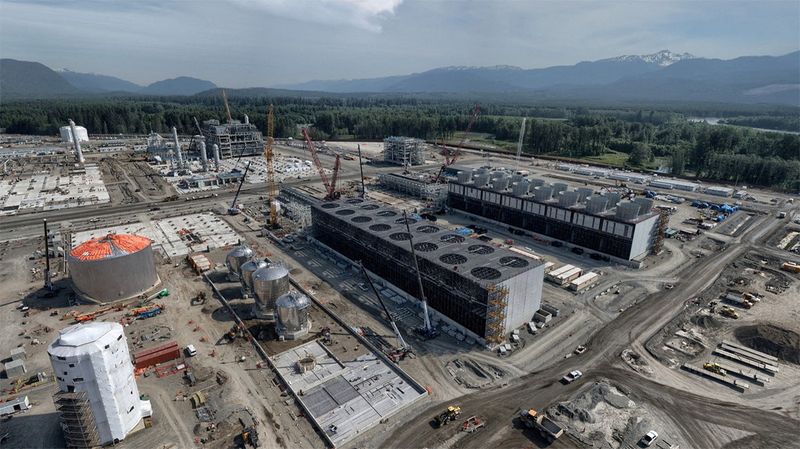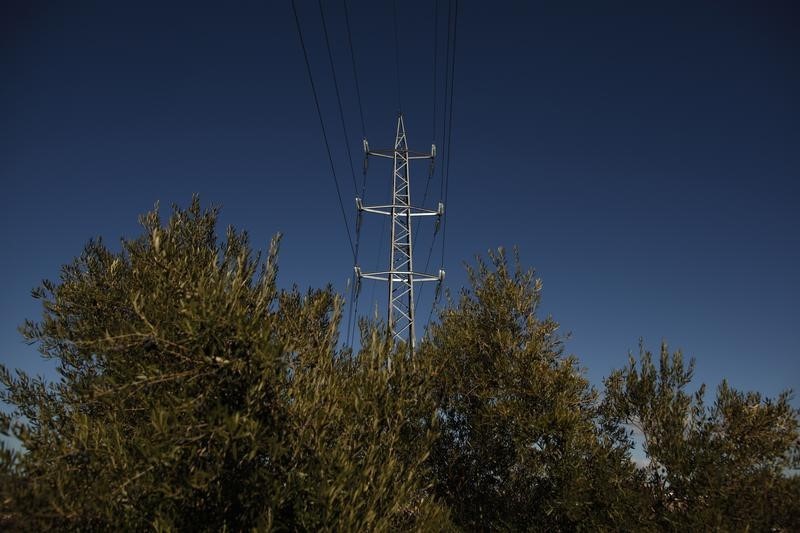
© Reuters. FILE PHOTO: LNG Canada web site building actions are held, in Kitimat, Canada, September 2022. LNG Canada/Handout by way of REUTERS/File Photograph
(This Jan. 19 story has been corrected to repair the affiliation of supply to Clear Power Canada, not Clear Power BC, in paragraph 17)
By Rod Nickel
WINNIPEG, Manitoba (Reuters) – British Columbia boosted its C$36 billion ($26.7 billion) plan to broaden its grid over the subsequent decade, however Canada’s Pacific Coast province will nonetheless fall wanting supplying the most important liquefied (LNG) tasks with hydropower wanted to keep away from producing excessive emissions.
Lengthy regulatory processes imply a crucial northern transmission line enlargement will solely be prepared years after LNG vegetation begin working and droughts are already curbing British Columbia’s (B.C.’s) energy era.
B.C. boosted its electrical energy grid spending plans on Tuesday by 50%, as demand soars from business for renewable hydropower and because the province switches to electrical autos and electrical heating in buildings.
“It is an enormous problem to fulfill all of the potential demand for electrical energy – daunting,” mentioned Barry Penner, a former B.C. atmosphere minister and now chair of Power Futures Initiative, a program of advocacy group Useful resource Works.
Supplying hydropower to LNG tasks, together with Shell-led LNG Canada, is crucial to the targets of the province and Canada to chop emissions sharply by 2030. LNG export services would faucet into profitable offshore demand for Canadian pure fuel.
LNG Canada, which is 90% full, will run its 14 million-metric ton each year facility on high-emission pure fuel, complicating Canada’s net-zero targets. The corporate, which is contemplating a second section that will swap to grid energy as soon as it is out there, mentioned in a press release on Thursday it’s inspired by authorities efforts to expedite electrical energy enlargement.
The important thing a part of B.C.’s grid plan for LNG Canada is the C$3 billion enlargement of a northwest transmission line. Constructing it will take as much as 10 years due to the necessity for settlement with First Nations and allowing, BC Hydro CEO Chris O’Riley mentioned.
“We’re all dedicated to getting these tasks constructed as shortly as attainable and all of us need them to run on electrical energy. That is our purpose,” O’Riley mentioned in an interview.
BC Hydro’s timeline means the transmission line will not be expanded till the early 2030s, after LNG Canada and rival proposals Ksi Lisims LNG and Cedar LNG are working.
FIRST NATIONS SUPPORT
A capacitor station undertaking in northwestern B.C. will present enough energy for Cedar LNG, a undertaking of the Haisla Nation and Pembina Pipeline (NYSE:), O’Riley mentioned. Ksi Lisims plans to start out up as early as 2028.
First Nations assist for the northwest transmission line may speed up the regulatory timeline. Ok’uul Energy, a consortium of 11 First Nations, is in talks to purchase 50% of the undertaking from BC Hydro.
“In the event you’re in cost, then you definately’re OK with going quick as a result of you may shield your pursuits,” mentioned Ok’uul CEO Alex Grzybowski. “An expedited course of is totally on the desk.”
B.C. has fashioned a job power to hurry up allowing for clear power tasks.
B.C., like Quebec, whose government-owned Hydro Quebec utility launched its personal long-term plan for grid enlargement in November, depends on hydro for many of its energy. That useful resource and B.C.’s coastal ports have made it the middle of Canada’s nascent LNG business. Neighboring Alberta in contrast depends on high-emission pure fuel to generate energy.
Droughts pose one other problem for B.C. BC Hydro imported a report one-fifth of its 2023 energy wants as drought minimize hydropower era.
BC Hydro plans so as to add wind and photo voltaic era to assist hedge the drought danger, O’Riley mentioned.
However B.C. should still lack enough energy to fulfill all industries, from LNG to mining of crucial minerals and hydrogen proposals, mentioned Evan Pivnick, program supervisor at Clear Power Canada.
“One of many key questions that B.C. goes to should confront is, which industries is it prioritising?” Pivnick mentioned.
($1 = 1.3511 Canadian {dollars})

